Ditapis dengan

GERCEP Gerak Cepat Menuju Kampus Impian TKA IPS 2025/2026 SMA/MA/SMK
Buku "Gercep (Gerak Cepat Menuju Kampus Impian) TKA (Tes Kemampuan Akademik) IPS SMA/MA/SMK 2025/2026". ini merupakan salah satu sumber belajar yang bisa digunakan untuk mengenal tipe-tipe soal TKA. Matematika, Bahasa Indonesia, Bahasa Inggris.
- Edisi
- -
- ISBN/ISSN
- 9786235072401
- Deskripsi Fisik
- 400 hlm.; 19 x 26 cm
- Judul Seri
- -
- No. Panggil
- 378 GUR g
A Publicity Stunt
Klub jurnalistik Matapena harus memiliki minimal tiga anggota baru agar tidak dibubarkan oleh pihak sekolah. Setelah berkutat dengan berbagai strategi, Mayra mendaftar sebagai School Crew di Snoop. Ia berharap namanya yang tercantum di halaman khusus anak muda Batavia Pos itu akan menarik calon anggota baru Matapena. Padahal, Mayra sudah kelas XII. Ia harus kucing-kucingan dengan Kak Sonya agar…
- Edisi
- -
- ISBN/ISSN
- 9786020677446
- Deskripsi Fisik
- 310 hlm
- Judul Seri
- -
- No. Panggil
- 813 SWA a
Dongeng Kucing
Haloo.... Perkenalkan, kami adalah sepasang kucing kecil kakak beradik. Kami tinggal di kolong bawah jalan tol. Rumah kami dibangun sejak kakek dan nenek kami tinggal di sini. Kami hidup berkoloni dengan hewan-hewan liar lainnya, yang dulunya juga dibuang oleh pemilik mereka. Ini adalah kisah keluarga kami, keluarga kucing-kucing liar. Kisah yang harus kami jalani untuk bertahan hidup dan sali…
- Edisi
- -
- ISBN/ISSN
- 9786020530826
- Deskripsi Fisik
- 195 hlm + illust; 13 x 19 cm
- Judul Seri
- -
- No. Panggil
- 813 CAN d
Dua Dunia
Buku ini merupakan kumpulan cerpen yang diterbitkan pertama kali tahun 1956 dan memuat tujuh cerpen. Semuanya ditulis ketika Nh Dini masih duduk di bangku SMA. Bahan-bahan cerpen tersebut diperolehnya dari pengamatan sekitar, lebih-lebih di antara pemondok, anak-anak sekolah serta pegawai kantor yang menumpang di rumahnya.
- Edisi
- -
- ISBN/ISSN
- 9789794194218
- Deskripsi Fisik
- 112 hlm; 14.5 x 21 cm
- Judul Seri
- -
- No. Panggil
- 813 DIN d

Negara Paripurna: Historititas, Rasionalitas, dan Aktualitas Pancasila
Buku ini menunjukan posisi dan kelas Yudi Latif sebagai intelektual-aktivis yang memiliki panggilan moral-intelektual tinggi untuk memantapkan Pancasila sebagai jati diri bangsa Indonesia dengan pendekatan ilmiah. Saya yakin buku ini akan menjadi karya klsik yang selalu bisa jadi rujukan siapapun yang ingin mengenal dan mendalami jati diri bangsa Indonesia. Buku ini wajib dimiliki dan dibaca ol…
- Edisi
- -
- ISBN/ISSN
- 9789792269475
- Deskripsi Fisik
- 671 hlm.; 23 cm x 15 xm
- Judul Seri
- -
- No. Panggil
- 320.5409 YUD n
Sejarah Gereja Indonesia
Buku ini menyajikan tinjauan mendalam tentang sejarah gereja di Indonesia, dengan fokus pada masuknya kekristenan, pertumbuhan dan perkembangannya hingga abad ke-21. Penulis mengangkat beberapa contoh penting sebagai pembelajaran berharga bagi umat Kristus, khususnya mereka yang tertarik pada sejarah gereja. Buku ini tidak hanya membahas peristiwa dan tokoh-tokoh penting, tetapi juga menyoroti …
- Edisi
- -
- ISBN/ISSN
- 9786233145855
- Deskripsi Fisik
- v + 447 hlm; 15 x 23 cm
- Judul Seri
- -
- No. Panggil
- 275.98 SIT s
Koleksi Lengkap Lagu-lagu Daerah dab Wajib Nasional
Indonesia merupakan negeri kaya budaya yang mempunyai berbagai macam budaya lokal maupun nasional. Salah satu budaya lokal maupun nasional. Salah satu budaya tersebut adlaah aneka lagu daerah yang mewakli berbagai daerah yang ada di Indonesia. Lagu-lagu tersebut adalah wujud kreatifitas seni yang merupakan warisan.
- Edisi
- -
- ISBN/ISSN
- 9786020874227
- Deskripsi Fisik
- 189 hlm + illust; 15 x 23 cm
- Judul Seri
- -
- No. Panggil
- 782.43 TIM k
Namaku Alam
18 Mei 1970. Hari gelap. Langit berwarna hitam dengan semburat garis ungu. Bulan bersembunyi di balik ranting pohon randu. Sekumpulan burung nasar bertengger di pagar kawat. Mereka mencium aroma manusia yang nyaris jadi mayat bercampur dengan bau mesiu. Terdengar lolongan anjing berkepanjangan. Empat orang berseragam berbaris rapi, masing-masing berdiri dengan senapan yang diarahkan kepada Bap…
- Edisi
- -
- ISBN/ISSN
- 9786231340825
- Deskripsi Fisik
- 437hlm + 13.5 x 20 cm
- Judul Seri
- -
- No. Panggil
- 899.2213 CHU n
Surat dari Samudra : Antologi Puisi Anak
Buku ini merupakan hasil kompilasi karya penulis-penulis terbaik di Jawa Tengah. Balai Bahasa Jawa Tengah menyeleksi karya empat puluh sembilan penulis yang berasal dari berbagai kalangan, baik anak maupun dewasa, untuk menyusun buku ini. Alhasil, terciptalah buku kumpulan puisi anak yang diharapkan apa yang disajikan di dalam buku ini bermanfaat bagi siswa sekolah dasar untuk bahan pendukung p…
- Edisi
- -
- ISBN/ISSN
- 9786025238994
- Deskripsi Fisik
- xxiv + 339 hlm; 14.5 x 20.5 cm
- Judul Seri
- -
- No. Panggil
- 811 WAH s
Yesus : Sebuah Novel
"Yesus ini menyebabkan munculnya rasa cinta dan masalah dalam hati orang-orang yang berjumpa dengan dirinya. Ibunya melihat dampak yang ditimbulkan pada banyak orang ketika Yesus hadir, bagaimana anak muda, laki-laki dan perempuan, akan menatap dia berlama-lama seperti seorang pengantin laki-laki pada kedatangannya yang pertama. Tetapi Maria juga melihat dalam diri orang-orang itu tanda-tanda m…
- Edisi
- -
- ISBN/ISSN
- 9789792127201
- Deskripsi Fisik
- illust + 659 hlm; 12.5 x 20 cm
- Judul Seri
- -
- No. Panggil
- 813 WAN y
Dari Cempurung ke Sunan Panggung
Buku berjudul Dari Cempurung ke Sunan Panggung ini merupakan antologi naskah lakon penulis Jawa Tengah. Buku yang memuat 35 naskah lakon ini diharapkan dapat bermanfaat bagi masyarakat untuk dijadikan bagian pembangunan peradaban yang lebih humanis dan inspiratif. Atas nama Balai Bahasa Jawa Tengah kami mengucapkan terima kasih kepada seluruh tim kerja dan semua pihak yang terlibat, sehingga b…
- Edisi
- -
- ISBN/ISSN
- 9786025239014
- Deskripsi Fisik
- ix + 326 hlm; 21 x 29.5 cm
- Judul Seri
- -
- No. Panggil
- 810 ZAH d
Menepis Sunyi, Menyibak Batas : Proses Kreatif Sastrawan Jawa Tengah
Buku ini merupakan antologi proses kreatif sastrawan Jawa Tengah yang berisi proses penciptaan karya sastra 35 sastrawan ini diharapkan dapat bermanfaat bagi masyarakat untuk dijadikan bagian pembangunan peradaban yang lebih humanis dan inspiratif.
- Edisi
- -
- ISBN/ISSN
- 9786025238987
- Deskripsi Fisik
- viii + 400 hlm; 14.5 x 21 cm
- Judul Seri
- -
- No. Panggil
- 810 TOH m
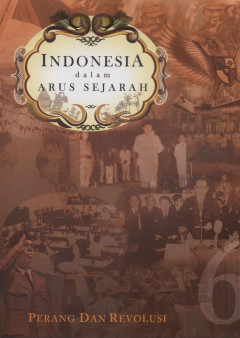
Indonesia dalam Arus Sejarah Jilid 6: Perang dan Revolusi
Indonesia dalam Arus Sejarah merupakan seri penerbitan yang terdiri dari 4.500 halaman, memuat 136 judul artikel yang disusun secara kronologis. Buku ini merupakan suatu karya kesejarahan sebagai wujud upaya merekonstruksi masa lalu yang lengkap dan utuh. Uraian para arkeolog dan sejarawan Indonesia ini disajikan dalam bahasa Indonesia yang mudah dimengerti dan diperkaya ilustrasi berwarna. Sel…
- Edisi
- Cet. 2
- ISBN/ISSN
- 9789799226983
- Deskripsi Fisik
- 579 hlm; 14,5 x 20,5 cm
- Judul Seri
- -
- No. Panggil
- 959.8 DAU i
Indonesia dalam Arus Sejarah Jilid 1 : Prasejarah
Sejarah Indonesia meliputi suatu rentang waktu yang sangat panjang, yang dimulai dengan zaman prasejarah oleh "manusia Jawa" pada masa sekitar 500.000 tahun lalu. Lalu disusul dengan munculnya kerajaan Hindu-Budha serta Islam di Jawa dan Sumatera yang terutama mengandalkan perdagangan. Kemudian datang orang Eropa (terutama Belanda) yang menginginkan rempah-rempah hingga mengakibatkan penjajahan…
- Edisi
- -
- ISBN/ISSN
- 9789799226938
- Deskripsi Fisik
- 358 hlm; 14.5 x 20 cm
- Judul Seri
- -
- No. Panggil
- 959.8 TAN i
Mariposa 2 : Kupu-kupu dan Bunga Matahari
Setelah lulus SMA, Iqbal dan Acha tetap menjalani hubungan sebagai sepasang kekasih yang manis. Hubungan mereka sudah berjalan dua tahun. Iqbal mengambil kuliah kedokteran dan Acha memutuskan untuk gap year. Acha ingin mencari apa yang dia inginkan untuk impian ke depannya. Sikap Iqbal tidak lagi sedingin dulu, hati Iqbal seutuhnya telah jatuh untuk seorang Acha. Begitu juga Acha yang semakin m…
- Edisi
- -
- ISBN/ISSN
- 9786236456101
- Deskripsi Fisik
- 392 hlm; 14.5 x 21 cm
- Judul Seri
- -
- No. Panggil
- 899.221 LUL m
Nebula
Selena dan Nebula adalah buku ke -8 dan ke-9 yang menceritakan siapa orang tua Raib dalam serial petualangan dunia paralel. Kedua buku ini bercerita tentang Akademi Bayangan Tingkat Tinggi, sekolah terbaik di seluruh klan Bulan. Tentang persahabatan tiga mahasiswa, yang diam-diam memiliki rencana petualangan ke tempat-tempat jauh. Tapi petualangan itu berakhir buruk, saat persahabatan tiga maha…
- Edisi
- -
- ISBN/ISSN
- 9786239987848
- Deskripsi Fisik
- 376hlm; 13 x 20 cm
- Judul Seri
- -
- No. Panggil
- 899.221 LIY n
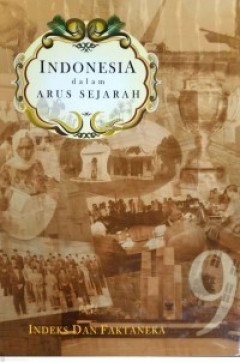
Indonesia dalam Arus Sejarah 9: Faktaneka dan Indeks
Sejarah Indonesia meliputi suatu rentang waktu yang sangat panjang, yang dimulai dengan zaman prasejarah oleh "manusia Jawa" pada masa sekitar 500.000 tahun lalu. Lalu disusul dengan munculnya kerajaan Hindu-Budha serta Islam di Jawa dan Sumatera yang terutama mengandalkan perdagangan. Kemudian datang orang Eropa (terutama Belanda) yang menginginkan rempah-rempah hingga mengakibatkan penjajahan…
- Edisi
- -
- ISBN/ISSN
- 9786029093018
- Deskripsi Fisik
- 109 hlm; 14.5 x 20.5 cm, ilus.
- Judul Seri
- -
- No. Panggil
- 959.8 TAU i
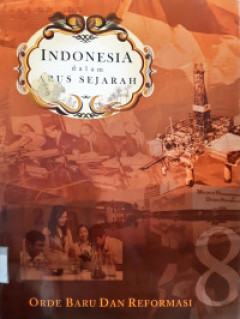
Indonesia dalam Arus Sejarah 8: Orde Baru dan Reformasi
Sejarah Indonesia meliputi suatu rentang waktu yang sangat panjang, yang dimulai dengan zaman prasejarah oleh "manusia Jawa" pada masa sekitar 500.000 tahun lalu. Lalu disusul dengan munculnya kerajaan Hindu-Budha serta Islam di Jawa dan Sumatera yang terutama mengandalkan perdagangan. Kemudian datang orang Eropa (terutama Belanda) yang menginginkan rempah-rempah hingga mengakibatkan penjajahan…
- Edisi
- -
- ISBN/ISSN
- 97897992261
- Deskripsi Fisik
- 684 hlm; 14.5 x 20.5 cm, ilus.
- Judul Seri
- -
- No. Panggil
- 959.8 ABD i
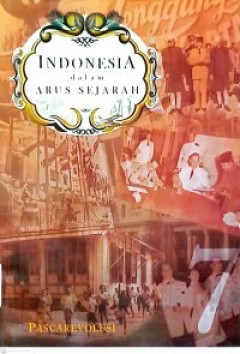
Indonesia dalam Arus Sejarah 7: Pascarevolusi
Sejarah Indonesia meliputi suatu rentang waktu yang sangat panjang, yang dimulai dengan zaman prasejarah oleh "manusia Jawa" pada masa sekitar 500.000 tahun lalu. Lalu disusul dengan munculnya kerajaan Hindu-Budha serta Islam di Jawa dan Sumatera yang terutama mengandalkan perdagangan. Kemudian datang orang Eropa (terutama Belanda) yang menginginkan rempah-rempah hingga mengakibatkan penjajahan…
- Edisi
- -
- ISBN/ISSN
- 9789799226990
- Deskripsi Fisik
- 547 hlm; 14.5 x 20.5 cm, ilus.
- Judul Seri
- -
- No. Panggil
- 959.8 DAH i
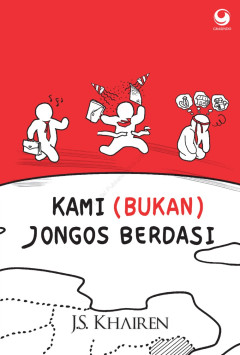
Kami (Bukan) Jongos Berdasi
Alumni kampus UDEL kini telah lulus. Masuk ke dunia nyata yang penuh tikus. Ada yang bertahan, ada yang sebentar lagi mampus. Kerja di Bank EEK? Ada. Kerjanya pindah terus? Ada. Bimbang ikut keinginan orang tua atau ikut kata hati? Ada. Apa lagi pengangguran banyak acara, pasti ada. Namun, diam-diam ada juga yang kariernya lancar, gajinya mekar, dan jodohnya gempar menggelegar. Mendapat intim…
- Edisi
- -
- ISBN/ISSN
- 978602053080
- Deskripsi Fisik
- 378 hlm; 13.5 x 21 cm
- Judul Seri
- -
- No. Panggil
- 899.2213 KHA k

Kami (Bukan) Fakir Asmara
“Fakir miskin dipelihara oleh negara, lalu siapa yang memelihara fakir asmara?” Patah hati? Hal biasa. Jadi "badut" yang menghibur saja? Apa boleh dikata. Ditinggal saat lagi sayang-sayangnya? Sudah level dewa. Berbeda dengan seri Kami (Bukan) lainnya yang selalu bertokoh-utamakan para mahasiswa dan alumni Kampus UDEL, di buku ini sang dosen mereka yang inspiratif itu jadi tokoh utama. …
- Edisi
- -
- ISBN/ISSN
- 9786020530918
- Deskripsi Fisik
- 387 hlm; 13.5 x 21 cm
- Judul Seri
- -
- No. Panggil
- 899.2213 KHA k

Kami (Bukan) Generasi Bac*t
Gaji? Cukup, cukup besar. Karier? Mulus melesat. Bisnis? Sebentar lagi soft launching. Karya? Sudah banyak yang suka. Jodoh? Aih! Sedikit lagi. Mantap betul nasib Arko, Gala, Juwisa, Sania, Ogi dan Randi. Para alumni Kampus UDEL yang amburadul ini, ternyata berhasil melawan tikus-tikus kehidupan. Namun, tikus-tikus tersebut nyatanya tidak sepenuhnya hilang. Mereka malah membes…
- Edisi
- -
- ISBN/ISSN
- 978602053093
- Deskripsi Fisik
- 264 hlm; 13.5 x 21 cm
- Judul Seri
- -
- No. Panggil
- 899.2213

Dompet Ayah Sepatu Ibu
Ada deras keringat ayah dan banjir tangis ibu dalam langkah kakimu hari ini. Dunia jahat dan kau kalah? Lihat telapak tanganmu. Ayah selalu menempa tangan itu agar tak menyerah. Ibu tak henti memapah tangan itu untuk berdoa. Bangkitlah untuk melangkah. Ini kisah tentang ayah dan ibu.Yang cintanya lahir sebelum kau lahir. Yang cintanya tumbuh sebelum kau tumbuh. Berlarilah dan hadiahkan ka…
- Edisi
- -
- ISBN/ISSN
- 9786020530222
- Deskripsi Fisik
- 216 hlm; 13.5 x 20 cm
- Judul Seri
- -
- No. Panggil
- 899.2213 KHA d
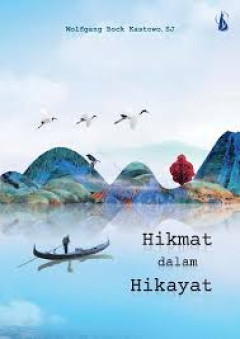
Hikmat dalam Hikayat
Buku ini berisi tentang beragam hikayat yang disajikan untuk pertemuan dalam retret yang diurutkan sesuai dengan urutan hari-hari dalam retret (hari ke-1 sampai dengan hari ke-5). Sesuai dinamika tema permenungan dalam retret, hikayat-hikayat disajikan dari awal permenungan yang sederhana hingga permenungan yang makin mendalam. Pada akhir setiap hikayat, disertakan pertanyaan penegasan serta ku…
- Edisi
- -
- ISBN/ISSN
- 9789792176254
- Deskripsi Fisik
- 217 hlm, 14,5 X 21 cm
- Judul Seri
- -
- No. Panggil
- 899.221
Indonesia dalam Arus Sejarah 5 : Masa Pergerakan Kebangsaan
Sejarah Indonesia meliputi suatu rentang waktu yang sangat panjang, yang dimulai dengan zaman prasejarah oleh "manusia Jawa" pada masa sekitar 500.000 tahun lalu. Lalu disusul dengan munculnya kerajaan Hindu-Budha serta Islam di Jawa dan Sumatera yang terutama mengandalkan perdagangan. Kemudian datang orang Eropa (terutama Belanda) yang menginginkan rempah-rempah hingga mengakibatkan penjajahan…
- Edisi
- -
- ISBN/ISSN
- 9789799226976
- Deskripsi Fisik
- 422 hlm; 14.5 x 20 cm
- Judul Seri
- -
- No. Panggil
- 959.8 LAP i
Indonesia dalam Arus Sejarah Jilid 4 : Kolonisasi dan Perlawanan
Sejarah Indonesia meliputi suatu rentang waktu yang sangat panjang, yang dimulai dengan zaman prasejarah oleh "manusia Jawa" pada masa sekitar 500.000 tahun lalu. Lalu disusul dengan munculnya kerajaan Hindu-Budha serta Islam di Jawa dan Sumatera yang terutama mengandalkan perdagangan. Kemudian datang orang Eropa (terutama Belanda) yang menginginkan rempah-rempah hingga mengakibatkan penjajahan…
- Edisi
- -
- ISBN/ISSN
- 9789799226969
- Deskripsi Fisik
- 668 hlm; 14.5 x 20 cm
- Judul Seri
- -
- No. Panggil
- 959.8 SUR i
Indonesia dalam Arus Sejarah Jilid 3 : Kedatangan dan Peradaban Islam
Sejarah Indonesia meliputi suatu rentang waktu yang sangat panjang, yang dimulai dengan zaman prasejarah oleh "manusia Jawa" pada masa sekitar 500.000 tahun lalu. Lalu disusul dengan munculnya kerajaan Hindu-Budha serta Islam di Jawa dan Sumatera yang terutama mengandalkan perdagangan. Kemudian datang orang Eropa (terutama Belanda) yang menginginkan rempah-rempah hingga mengakibatkan penjajahan…
- Edisi
- -
- ISBN/ISSN
- 9789799226952
- Deskripsi Fisik
- 442 hlm; 14.5 x 20 cm
- Judul Seri
- -
- No. Panggil
- 959.8 ABD i
Indonesia dalam Arus Sejarah Jilid 2 : Kerajaan Hindu - Buddha
Sejarah Indonesia meliputi suatu rentang waktu yang sangat panjang, yang dimulai dengan zaman prasejarah oleh "manusia Jawa" pada masa sekitar 500.000 tahun lalu. Lalu disusul dengan munculnya kerajaan Hindu-Budha serta Islam di Jawa dan Sumatera yang terutama mengandalkan perdagangan. Kemudian datang orang Eropa (terutama Belanda) yang menginginkan rempah-rempah hingga mengakibatkan penjajahan…
- Edisi
- -
- ISBN/ISSN
- 9789799226938
- Deskripsi Fisik
- 360 hlm
- Judul Seri
- -
- No. Panggil
- 959.8 MUN i
Rara Mendut
Rara Mendut, wanita rampasan yang menolak diperistri oleh Tumenggung Wiraguna demi cintanya kepada Pranacitra. Dibesarkan di kampung nelayan pantai utara Jawa, ia tumbuh menjadi gadis yang trengginas dan tak pernah ragu menyuarakan isi pikirannya. Sosoknya dianggap membangkang tatanan di lingkungan istana, di mana perempuan diharuskan bersikap halus dan patuh. Tetapi ia tak gentar. Baginya, leb…
- Edisi
- -
- ISBN/ISSN
- 9786020634760
- Deskripsi Fisik
- 338 hlm; 14 x 21 cm
- Judul Seri
- -
- No. Panggil
- 899.221 MAN r
Bothekan Karawitan 2
Tidak jauh berbeda dengan edisi sebelumnya, Bothekan Karawitan 2 ini juga merupakan kumpulan cerita pengalaman penulis selama lebih dari 50 tahun sejak mulai belajar menabuh gamelan, kemudian ikut menabuh, membicarakan, dan membuat gendhing atau komposisi baru. Tulisan ini sekedar perwujudan dari usaha mengurangi rasa bersalah penulis dan dosa terhadapk karawitan, dunia yang menghidupinya. Dala…
- Edisi
- -
- ISBN/ISSN
- 979821756X
- Deskripsi Fisik
- xix + 358 hm; 14 x20 cm
- Judul Seri
- -
- No. Panggil
- 781.621 SUP b
Bothekan Karawitan 1
Sampai beberapa waktu yang lalu, di rumah-rumah keluarga Jawa, hampir semua keluarga memiliki benda yang berfungsi sebagai wadah, berupa rangkaian kotak-kotak kecil yang digunakan untuk menyimpan rempah-rempah, tumbuhan, biji-bijian, bunga, dedaunan kering. Produk tumbuhan yang disebut empon-empon itu, sewaktu waktu dapat diramu dan digunakan untuk menyembuhkan berbagai macam penyakit. Sesuai n…
- Edisi
- -
- ISBN/ISSN
- 979970717
- Deskripsi Fisik
- xi + 150 hlm; 14 x 20 cm
- Judul Seri
- -
- No. Panggil
- 781.621 SUP b
Satu Abad Gereja Jago Ambarawa 1924 - 2024
Buku Satu Abad Gereja Jago Ambarawa 1924 - 2024 ini berisi kisah-kisah syukur; yang ditulis ke dalam lima bagian utama: (1) Berjalan Bersama Tuhan, (2) Berjalan sebagai Saudara, (3) Berjalan Bersama Semesta, (4) Berjalan Diiringi Doa, serta (5) Berjalan dari Bulan ke Bulan. Dengan membaca buku ini kita diajak melihat miniatur dari dinamika perjalanan iman umat Gereja Jago bersama dengan Allah d…
- Edisi
- -
- ISBN/ISSN
- 9789792182309
- Deskripsi Fisik
- xxix + 293 hlm; 14,5 x cm21
- Judul Seri
- -
- No. Panggil
- 275.98 SUF s
E-book Performing Power : Cultural Hegemony, Identity, and Resistance in Colo…
Following a successful period working in the colonial capital of Batavia ( Jakarta), Prawiradinata, a young and ambitious clerk in the indigenous civil service, was transferred to a new post in Purwakarta, a small town in Java’s interior. His enthusiasm about his career advancement quickly evaporated when he discovered that beyond the capital, …
- Edisi
- -
- ISBN/ISSN
- 9781501758591
- Deskripsi Fisik
- 293 hlm
- Judul Seri
- -
- No. Panggil
- 959.802 VAN p
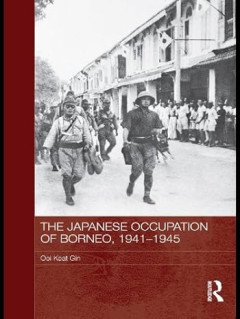
E-book The Japanese Occupation of Borneo, 1941-1945 ((Routledge Studies in th…
The Japanese occupation of both British Borneo – Brunei, Sarawak and North Borneo – and Dutch Borneo in 1941 to 1945 is a much understudied subject. Of particular interest is the occupation of Dutch Borneo, governed by the Imperial Japanese Navy that had long-term plans for ‘permanent possession’. This book surveys Borneo under Western colonialism, examines pre-war Japanese interests in…
- Edisi
- -
- ISBN/ISSN
- 9780415837903
- Deskripsi Fisik
- 224 halaman, ilus.
- Judul Seri
- -
- No. Panggil
- 959.802 OOI t

Nayla
Inilah Novel pertama karya Djenar Maesa Ayu, seorang penulis perempuan yang selalu menuai kontroversi untuk setiap karyanya. Setelah menulis dua kumpulan cerpen, kini Djenar menghadirkan Nayla, novel yang berkisah tentang cinta yang terdistorsi antara manusia dalam setiap wujud relasinya. Antara sesama, antara laki-laki dan perempuan, antara ibu dan anak. Dengan tetap mempertahankan inovasi dal…
- Edisi
- Cet. 6
- ISBN/ISSN
- -
- Deskripsi Fisik
- 180 hlm, 14 x 20 cm
- Judul Seri
- -
- No. Panggil
- 899.2213 DJE n
E-book The Bugis Chronicle of Bone
We present, in this book, a transliterated transcription of the Bugis text of the work known as the Chronicle of Bone, together with an English translation and notes. The chronicle deals with the affairs of this traditional kingdom in South Sulawesi—almost exactly in the centre of modern Indonesia—from the fourteenth century to the middle of the seventeenth century CE…
- Edisi
- -
- ISBN/ISSN
- 9781760463588
- Deskripsi Fisik
- 166 hlm
- Judul Seri
- -
- No. Panggil
- 909.041 MAC t
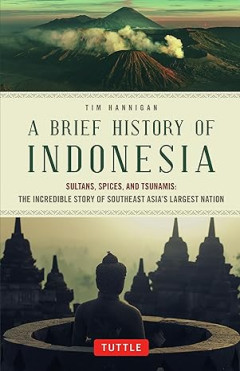
E-book A Brief History of Indonesia: Sultans, Spices, and Tsunamis: The Incre…
Indonesia is by far the largest nation in Southeast Asia and has the fourth largest population in the world after the United States. Indonesian history and culture are especially relevant today as the Island nation is an emerging power in the region with a dynamic new leader. It is a land of incredible diversity and unending paradoxes that has a long and rich history stretching back a thousand …
- Edisi
- -
- ISBN/ISSN
- 9780804844765
- Deskripsi Fisik
- 251 halaman, ilus.
- Judul Seri
- -
- No. Panggil
- 959.8 HAN a
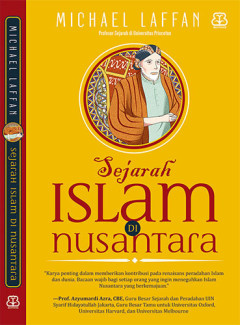
E-book Sejarah Islam Di Nusantara
Agama Islam tidak dilahirkan di Indonesia, namun justru negara inilah yang memiliki penduduk muslim dengan jumlah terbesar di dunia. Bagaimanakah cara agama ini masuk dan berkembang di antara suku dan budaya yang beragam di nusantara? Fondasi pertanyaan ini kemudian menggerakkan Michael Laffan, Profesor Sejarah di Universitas Princenton, untuk meneliti proses tumbuh kembangnya Islam di Indonesi…
- Edisi
- -
- ISBN/ISSN
- 9786022910589
- Deskripsi Fisik
- 328 halaman.
- Judul Seri
- -
- No. Panggil
- 297.965 98 LAF s
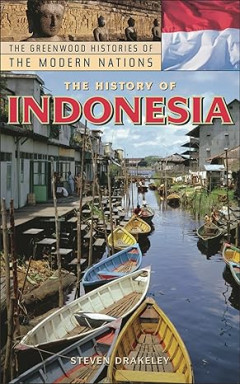
E-book The History of Indonesia (The Greenwood Histories of the Modern Nations)
Culturally and politically, Indonesia is one of the more complex countries in the world, with 336 ethnic groups speaking 583 languages and dialects. It is only recently that these people have been contained within one political framework. Throughout most of history, Indonesia's inhabitants were divided politically in many different ways as a bewildering array of kingdoms and empires rose and fe…
- Edisi
- -
- ISBN/ISSN
- 9780313331146
- Deskripsi Fisik
- 228 halaman
- Judul Seri
- -
- No. Panggil
- 959.8 DRA t
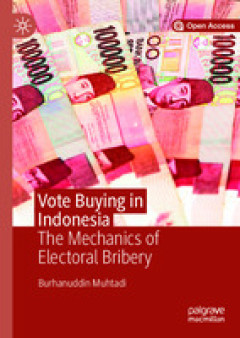
E-book Vote Buying in Indonesia: The Mechanics of Electoral Bribery
This book is open access under a CC BY 4.0 license. This book investigates the impact of vote buying on the accountability of democratic institutions and policy representation in newly democratic countries, with a focus on Indonesia. In doing so, the book presents a wide-ranging study of the dynamics of vote buying in Indonesia’s young democracy, exploring the nature, extent, determinants, ta…
- Edisi
- -
- ISBN/ISSN
- 9789811367786
- Deskripsi Fisik
- 318 halaman
- Judul Seri
- -
- No. Panggil
- 320.9598 MUH v
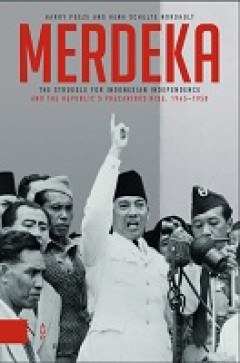
E-book Merdeka: The Struggle for Indonesian Independence and the Republic’s…
Under the slogan ‘Merdeka!’ the Republic of Indonesia rushed into a battle for independence – a struggle of which no one could predict the outcome. Harry Poeze and Henk Schulte Nordholt provide a new narrative about the revolution, one that focuses not only on the fight against the Dutch but also on the precarious rise of the Republic. After the horrors of the Japanese occupation, the Rep…
- Edisi
- -
- ISBN/ISSN
- 9789048560837
- Deskripsi Fisik
- 456 halaman
- Judul Seri
- -
- No. Panggil
- 959.8035 POE m
E-book Beyond the Pale : Dutch Extreme Violence in the Indonesian War of Inde…
Between 1945 and 1949, Indonesia defended its recently declared indepen-dence, and the Netherlands waged its last major colonial war.1 Much is now known about this war, but a great deal has also remained unclear or con-tested. At the end of 2016, the second Rutte cabinet decided to finance a broad-based study – conducted by the kit lv, the nimh and niod2 – on the …
- Edisi
- -
- ISBN/ISSN
- 789048557172
- Deskripsi Fisik
- 594 hlm
- Judul Seri
- -
- No. Panggil
- 959.802 AMS b
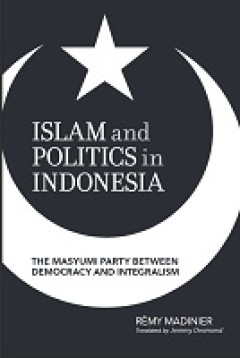
E-book Islam and Politics in Indonesia: The Masyumi Party between Democracy a…
The Masyumi Party, which was active in Indonesia from 1945 to 1960, constitutes the boldest attempt to date at reconciling Islam and democracy. Masyumi proposed a vision of society and government which was not bound by a literalist application of Islamic doctrine but rather inspired by the values of Islam. It set out moderate policies which were tolerant towards other religious communities in I…
- Edisi
- -
- ISBN/ISSN
- 9789814722568
- Deskripsi Fisik
- 506 halaman
- Judul Seri
- -
- No. Panggil
- 324.2598 MAD i
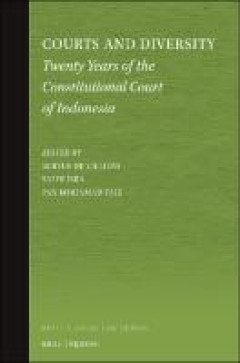
E-book Courts and Diversity: Twenty Years of the Constitutional Court of Indo…
The Constitutional Court of Indonesia functions in one of the most diverse societies in the world. It is required to resolve disputes within a kaleidoscope of diversity and plurality with flexibility, pragmatism, asymmetry, and wisdom. Whilst national minimum norms are important for nation-building, recognition of local customs, diversities and indigenous systems are equally important to protec…
- Edisi
- -
- ISBN/ISSN
- 9789004691698
- Deskripsi Fisik
- -
- Judul Seri
- -
- No. Panggil
- 341 VILL c
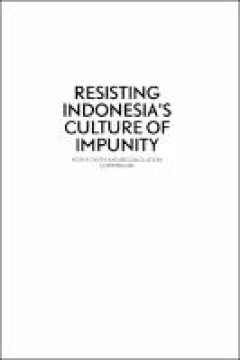
E-book Resisting Indonesia's Culture of Impunity: Aceh's Truth and Reconcilia…
Resisting Indonesia's Culture of Impunity examines the role of Indonesia’s first truth and reconciliation commission—the Aceh Truth and Reconciliation Commission, or KKR Aceh—in investigating and redressing the extensive human rights violations committed during three decades of brutal separatist conflict (1976–2005) in the province of Aceh. The KKR Aceh was founded in late 2016, as a pr…
- Edisi
- -
- ISBN/ISSN
- 9781760465841
- Deskripsi Fisik
- 282 halaman
- Judul Seri
- -
- No. Panggil
- 320.9598 MEL r
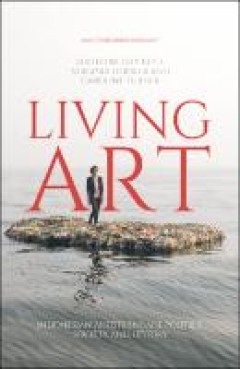
E-book Living Art: Indonesian Artists Engage Politics, Society and History
Living Art: Indonesian Artists Engage Politics, Society and History is inspired by the conviction of so many of Indonesia's Independence-era artists that there is continuing interaction between art and everyday life. In the 1970s, Sanento Yuliman, Indonesia’s foremost art historian of the late twentieth century, further developed that concept, stating: 'New Indonesian Art cannot wholly be und…
- Edisi
- -
- ISBN/ISSN
- 9781760464936
- Deskripsi Fisik
- 400 halaman
- Judul Seri
- -
- No. Panggil
- 320.9598 HOO l
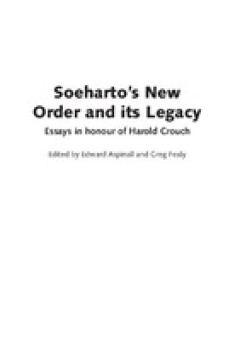
E-book Soeharto's New Order and its Legacy: Essays in honour of Harold Crouc
Indonesia’s President Soeharto led one of the most durable and effective authoritarian regimes of the second half of the twentieth century. Yet his rule ended in ignominy, and much of the turbulence and corruption of the subsequent years was blamed on his legacy. More than a decade after Soeharto’s resignation, Indonesia is a consolidating democracy and the time has come to reconsider the p…
- Edisi
- -
- ISBN/ISSN
- -
- Deskripsi Fisik
- 224 halaman
- Judul Seri
- -
- No. Panggil
- 320.9598 ASP s

E-book Authoritarian Modernization in Indonesia’s Early Independence Period…
In Authoritarian Modernization in Indonesia’s Early Independence Period, Farabi Fakih offers a historical analysis of the foundational years leading to Indonesia’s New Order state (1966–1998) during the early independence period. The study looks into the structural and ideological state formation during the so-called Liberal Democracy (1950–1957) and Sukarno’s Guided Democracy (1957�…
- Edisi
- -
- ISBN/ISSN
- 9789004437722
- Deskripsi Fisik
- 314 halaman
- Judul Seri
- -
- No. Panggil
- 959.8 FAK a
Angin Laut Tawar
Sebagai anak desa yang bergaul dengan alam secara akrab, walaupun saya telah lama meninggalkan kampung kelahiran saya dan berada jauh di ibukota, rasanya saya tetap masih berada di tengan alam Takengon. Kota besar seperti Jakarta, di masa saya hidup, seolah-olah tidak merangsang saya untuk menulis puisi, mungkin karena rasa rindu saya kepada alam di mana saya hidup di masa kecil jauh lebih mere…
- Edisi
- -
- ISBN/ISSN
- -
- Deskripsi Fisik
- 38 halaman
- Judul Seri
- -
- No. Panggil
- 813 ARA a
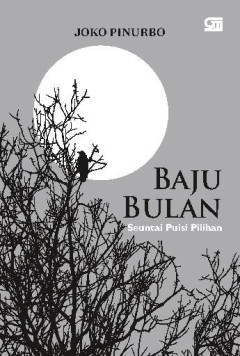
E-book Baju Bulan
"Rindu seperti sajak sederhana yang tak ada matinya. (2003) Setelah punya rumah, apa cita-citamu? Kecil saja: ingin sampai rumah saat senja supaya saya dan senja sempat minum teh bersama di depan jendela. (2004) Dengan kata lain, kamu tak akan pernah bisa membayar gurumu. (2004) Menggigil adalah menghafal rute menuju ibukota tubuhmu. (2005) Berilah kami rejeki pada hari ini dan ampu…
- Edisi
- -
- ISBN/ISSN
- -
- Deskripsi Fisik
- 96 halaman
- Judul Seri
- -
- No. Panggil
- 813 PIN b
 Karya Umum
Karya Umum  Filsafat
Filsafat  Agama
Agama  Ilmu-ilmu Sosial
Ilmu-ilmu Sosial  Bahasa
Bahasa  Ilmu-ilmu Murni
Ilmu-ilmu Murni  Ilmu-ilmu Terapan
Ilmu-ilmu Terapan  Kesenian, Hiburan, dan Olahraga
Kesenian, Hiburan, dan Olahraga  Kesusastraan
Kesusastraan  Geografi dan Sejarah
Geografi dan Sejarah